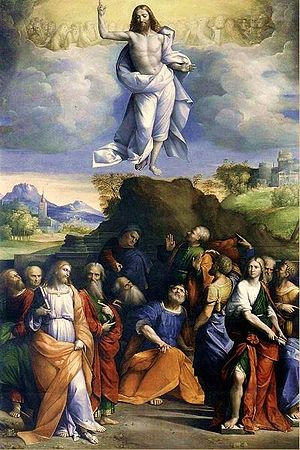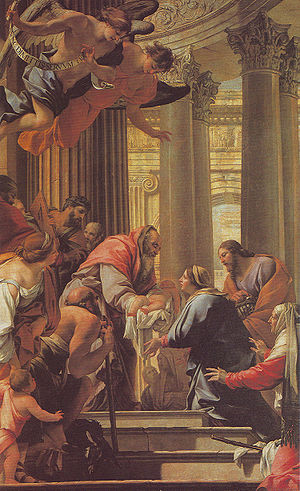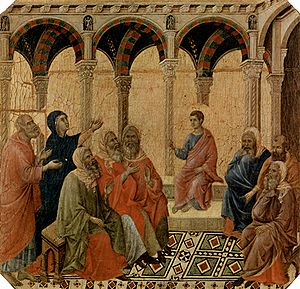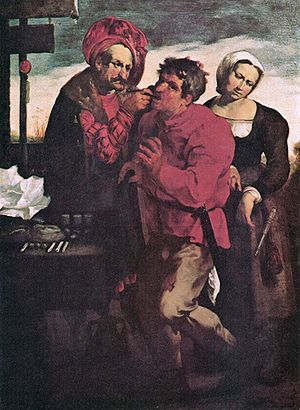Today’s rosary meditation focuses on the Fourth Sorrowful Mystery — Jesus Carries His Cross. This mystery encapsulates many of the Stations of the Cross. We see Jesus take up the cross, fall repeatedly, meet the mourning women, be stripped of his garments, and nailed to the cross. Like the other Sorrowful Mysteries, Jesus carrying His cross teaches us about the nature of suffering and that we are called to love God and do His Will despite any suffering we may encounter in our lives.
While carrying the cross, Jesus fell down repeatedly. His falling is significant since we dedicate three Stations of the Cross to it. And yet each time Jesus fell He got back up. But why did Jesus continue to get up and continue suffering at the hands of the Roman soldiers? He must have known that each time He got up His situation was only going to get worse as He became more tired and beaten and crucifixion was the only thing that awaited Him. Why didn’t He just give up and die where He lay and avoid the increasing pain and torment? What pushed Jesus to get back on His feet?
Jesus continued because He understood that the purpose of following God’s Will is not to avoid suffering and find comfort in this life. Just the opposite, our purpose in life is to follow God’s Will despite the suffering it may bring. Jesus followed God’s Will out of love for His Father and love for us. Jesus’ love was greater than the physical pain He felt and that is why He got back up and continued to His crucifixion. Likewise, God desires us to love Him despite the suffering we may encounter doing so. We know that part of loving someone is to make sacrifices at times. And while Jesus taking up His cross is an extreme example of this truth, this mystery reminds us that we are also called to love God regardless of our earthly situation.
We may think there is a huge difference between the Son of God mustering up the strength to carry on in the face of great suffering versus us finding it in our daily struggles. It is very common to question God’s plan when “the going gets tough” and we do not get what we want or what we think is fair. I often come across people on Catholic forums asking, “Why me?” “Why can’t I find a job?” “Why can’t I find a good spouse?” “Why did I get this illness?” “I pray every day, I go to Mass, I go to Confession, and I don’t commit any mortal sins so why does God make my life so difficult?” The answer to all these questions lies within this mystery. Suffering is part of this life while our reward for loving God and doing His Will will be part of the next. We endure the trials of this life because our faith tells us that we will find comfort and relief in God’s Kingdom. Unfortunately, this is not the answer many of us want to hear. We want instant miracles. We want our problems to disappear. We would love God to “bail us out” immediately when we pray to Him. However, we do not see the big picture as God sees it. What we see as monumental suffering now in this life ultimately amounts to nothing compared to the glory of Heaven that awaits us in the next life. At the same time, following God’s Will, even in the face of great suffering, will yield tremendous happiness and comforts in Heaven. And in the end, finding eternal happiness in Heaven is all that really matters, not the momentary suffering and comforts in this world.
We should pray for all those who have “fallen” in life that they find the strength to get back up and follow God’s plan. We should pray for those who think God has abandoned them when in fact God is right here pushing them to work through their troubles. We should pray for those who do not follow God’s Will just to reap the comforts of this life at the cost of comforts in the next one. We should pray for the understanding that we love God most when we follow Him regardless of the earthly consequences. Finally, we should pray for the faith that all earthly suffering will be relieved when we enter into our true home, God’s kingdom of Heaven.
Related articles by Zemanta
- Easter’s True Message (tlfm.org)
- Jesus did all the hard stuff so now let us do our part (pastorpaulvbsblog.blogspot.com)


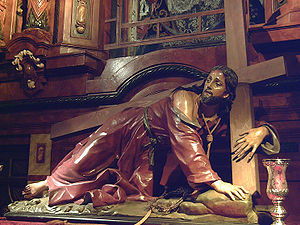
 This rosary meditation focuses on the Third Sorrowful Mystery — The Crowning of Thorns. The Roman soldiers mocked Jesus by dressing Him in royal purple and crowning Him with thorns (Mk. 15:17). They then mocked Him and pretended to pay Him homage (Mk. 15:19). Would the soldiers have acted so cavalier and arrogant if they truly understood who it was they were mocking? While we are not as brazen as those soldiers, we often mock Jesus by giving lip service to our faith. Instead of faithfully following Jesus, we too often dishonor Him by putting the fleeting treasures of this life in front of the treasures waiting for us in
This rosary meditation focuses on the Third Sorrowful Mystery — The Crowning of Thorns. The Roman soldiers mocked Jesus by dressing Him in royal purple and crowning Him with thorns (Mk. 15:17). They then mocked Him and pretended to pay Him homage (Mk. 15:19). Would the soldiers have acted so cavalier and arrogant if they truly understood who it was they were mocking? While we are not as brazen as those soldiers, we often mock Jesus by giving lip service to our faith. Instead of faithfully following Jesus, we too often dishonor Him by putting the fleeting treasures of this life in front of the treasures waiting for us in 
